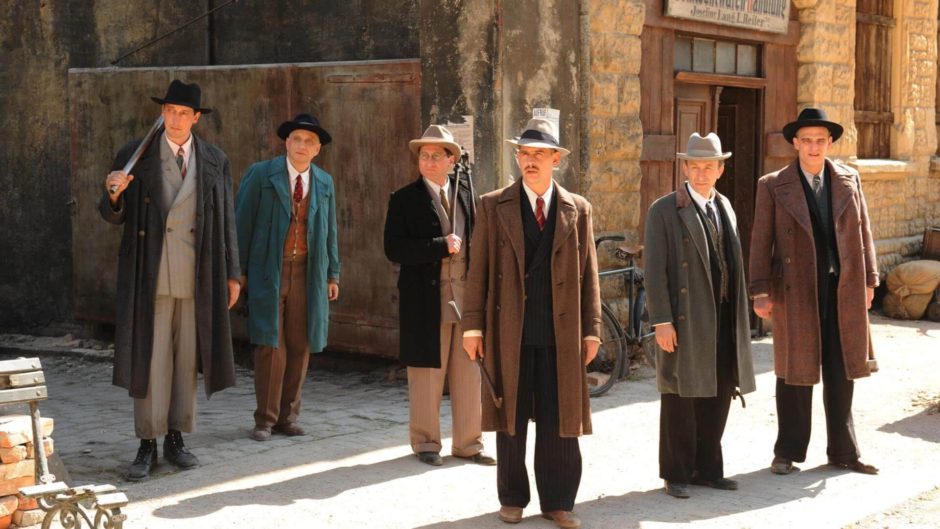The Toronto Jewish Film Festival, which runs from May 3 to May 13 this year, is presenting three movies from Germany. Bye-Bye Germany is set in 1946 as Holocaust survivors in Frankfurt struggle to renew their lives amid the rubble of the war. The Invisibles follows the lives of four Jews in Berlin who went into hiding between 1943 to 1945 to escape Nazi persecution. Winter Hunt charts the confrontation between a vengeful Jewish woman and an unrepentant Nazi.
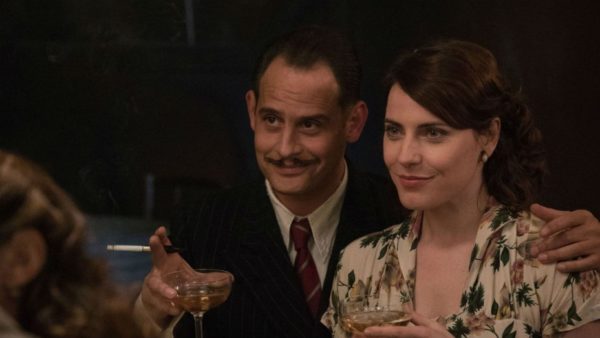
The central character in Sam Garbarski’s droll comedy, Bye-Bye Germany, which will be screened on May 6 and 8, is David Bermann (Moritz Bleibtreu), a German Jew who has been accused of being a Nazi collaborator. He’s being interrogated by Sara Simon (Antje Traue), a U.S. army officer of German-Jewish origin who listens to his version of events with a mixture of skepticism and empathy.
He claims that, while imprisoned in the Sachsenhausen concentration camp, one of its commandants took a liking to his dry sense of humor and asked him to be its court jester. Having been satisfied with his stint as a standup comedian, he asked Bermann to accept a special assignment under an assumed name — teaching Hitler jokes. If this is “collaboration,” he muses, so be it.
It all sounds absurd and implausible, but Garbarski pulls it off, at least to some degree.
With the war over, Bermann — a suave wheeler-dealer whose family owned a high-end linen shop — reestablishes himself in the same business. In a displaced persons camp, he recruits several salesmen. “Hitler is dead, but we’re alive,” Bermann observes, trying to convince them they’re the masters of their own destiny. They dream of immigrating to the United States, so the commissions they earn will come in handy.
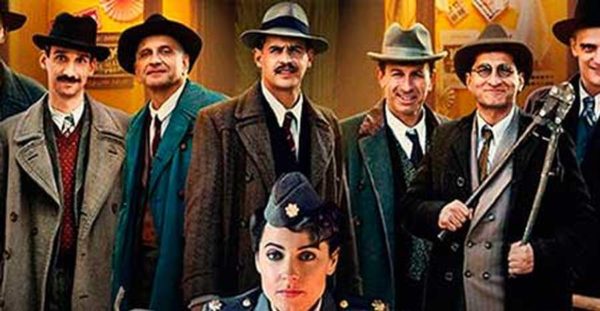
Bermann, almost always accompanied by his three-legged dog, Motek, devises a scheme to unload the French linen to an assortment of naive German buyers at prohibitively high prices. Having been persecuted by Germany, he feels no remorse whatsoever in gouging his customers.
In the meantime, as Simon continues to question Bermann about his wartime activities, he develops a crush for her. Bleibtreu, dressed to the nines, is terrific as a man attempting to come to terms with his past. The film itself, while quite amusing in places, is wooden all too often.
In June 1943, German Propaganda Minister Joseph Goebbels boasted in his diary that Berlin was “Judenrein,” free of Jews. He assumed they had been rounded up and sent to concentration or labor camps. He was wrong. Seven thousand Jews, known as “submarines,” had gone into hiding in the German capital.
The Invisibles, directed by Claus Raefle and scheduled to be screened on May 8 and 9, tells their collective story through the eyes of four such German Jews: Cioma Schonhaus, Ruth Arndt, Eugen Friede and Hani Levi. It unfolds through reenactments, interviews and file footage.
They all have a burning desire to live and outwit the Nazis, but dread the insistent knock on the door by the Gestapo. They also fear being betrayed by Stella Goldschlag, one of 20 notorious Jewish informers who work for the Gestapo in exchange for their lives.
Relentlessly hunted by the Nazis, the Jewish fugitives are always on the run, never quite knowing where they will sleep next.
Eugen finds accommodation with an anti-Nazi family, but this arrangement crumbles because the man of the house fears retribution by the Nazis.
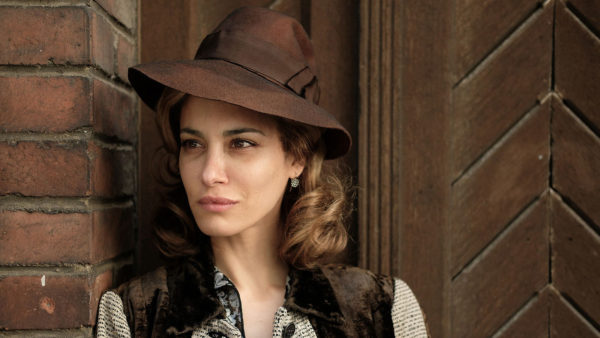
Hani dyes her hair blonde and renames herself Hannelore Winkler. Ruth pretends to be homeless, a victim of an Allied bombing raid that demolished her house. She can never be certain what tomorrow would bring. “We live from hour to hour, from day to day,” she says.
Eugen is shocked to learn that the Nazis have a plan to murder Jews on an industrial scale. Having been captured by the Gestapo, he is taken to a deportation center in what was once a Jewish hospital.
Cioma, an art student who forged official German documents, carries a soldier’s card so he can say he’s on home leave. In desperation, he hatches a scheme to cycle into Switzerland, a neutral safe haven.
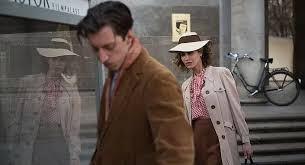
Arndt knows the war has ended when she sees Russian soldiers in a jeep. Hani has to take precautions to ensure she will not be raped by Red Army soldiers. Eugen and a friend would have been shot by a Soviet army officer had he not discovered they are Jewish.
Eugen, Hani, Cioma and Ruth were among 1,700 Jews who survived their ordeal in Berlin. The rest of the Jews in hiding were caught and murdered. Eugen, Hani, Cioma and Ruth emigrated, but Eugen returned to Germany.
Katrin Bauer, a young woman, drives through a wooded stretch of scenic countryside in a remote corner of Germany. She stops, walks into a dense forest and practices her marksmanship with a pistol. She continues walking until she reaches a mansion in the mist. She knocks on the door and it is opened by Maria Rossberg (Elisabeth Degen), a suspicious middle-aged woman. Katrin (Carolyn Genzkow) says she’s had a car accident and needs help.
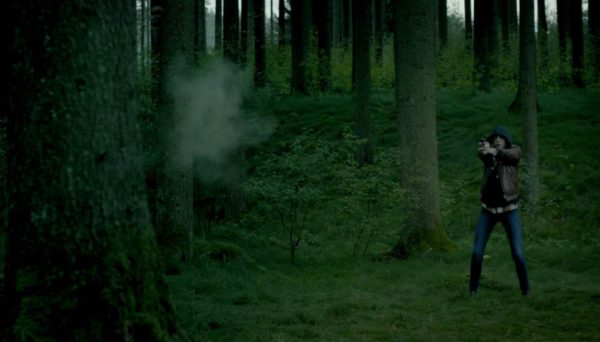
So begins Astrid Schult’s eerie movie, Winter Hunt, which will be screened on May 6 and 10.
Their conversation soon turns to Maria’s father, Anselm Rossberg (Michael Degen), who’s upstairs in his bedroom. “We’re being stalked,” complains Maria, referring to the legion of visitors who’ve shown up at their house uninvited. Rossberg, the 91-year-old object of Katrin’s curiosity, is a controversial figure. Accused of being a Nazi war criminal, he was acquitted in a trial. Maria, his devoted daughter, insists he’s innocent. Katrin believes he’s guilty of terrible crimes.
Maria correctly senses that Katrin is driven by an agenda. Before Maria can react to this intruder, Katrin barges into Rossberg’s room, brandishing a pistol. “Do you remember October 1944?” she asks menacingly, proceeding to describe what happened at Auschwitz-Birkenau in that month.
The tension escalates as the hatred boils up on both sides.
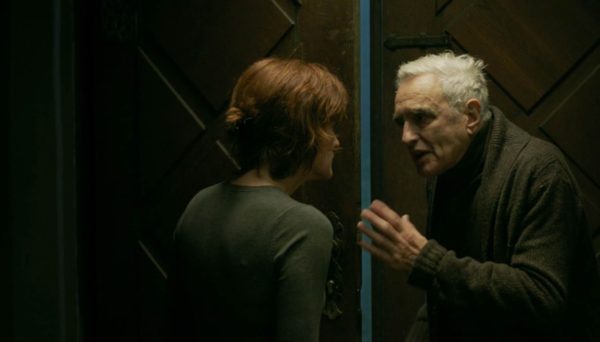
Rossberg claims he was a mere “typist” in that concentration camp, not a guard, as she thinks. He calls her a “left-wing nut” and says he’s sick of this “anti-Nazi crap.” She presents him with a brief recital of his past. Having served on the Eastern front in the Soviet Union, he was transferred to Auschwitz.
Maria hits Katrin, she staggers out of the house and falls to the ground. After Maria drags Katrin back, Rossberg continues their heated discussion and demands an apology. Instead of giving in to his demand, she mentions a name — Rachel Epstein, who died two weeks ago. Rachel, Katrin’s grandmother, was 15 when she arrived in Auschwitz in the autumn of 1944. Before she passed away, she recognized Rossberg on TV and told Katrin what he had done to her.
Rossberg, professing to admire Katrin’s devotion to her grandmother, claims he’s not “a bad person.” Katrin exposes him, sending shock waves through the room and forcing Maria to reconsider her rosy assessment of her father. In short, Katrin’s revelations shatter the status quo.
The morale of Winter Hunt is that the past is never dead and that it can roar back with a vengeance.
